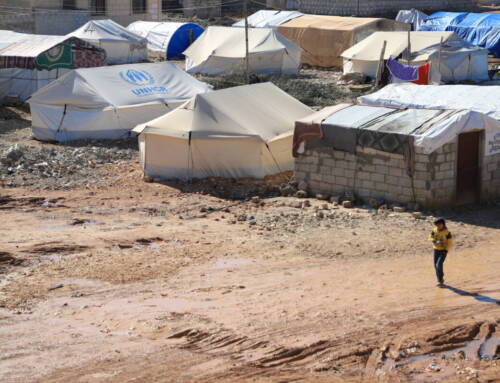Parliamentary elections 2016: Bashar, ballots and blockades
AMMAN: Hours after President Bashar al-Assad and his wife voted […]
14 April 2016
AMMAN: Hours after President Bashar al-Assad and his wife voted in Syria’s parliamentary elections after polls opened on Wednesday, the Higher Judicial Committee for Elections extended voting for an additional five hours due to “massive turnout,” reported Syria’s state news agency SANA the same day.
The elections are the second time that the Syrian regime has held since in 2012.
“The Syrian people are engaged in a war that has been going on for five years, through which terrorism managed to shed innocent blood and destroy much infrastructure, but it failed in achieving the primary goal it was assigned, which is destroying the principle structure in Syria, meaning the social structure of the national identity,” al-Assad told state media after casting his ballot Wednesday, according to SANA.
The regime reportedly set up over 7,300 voting centers throughout 13 of Syria’s 15 provinces (excluding A-Raqqa and Idlib) so citizens could cast their ballot for one of the more than 3,500 candidates up for election to the People’s Assembly Elections Wednesday through Friday, reported SANA. What was not clear was how 17 polling stations were set up in Deir e-Zor, where the pockets of areas under regime control are completely encircled by the Islamic State.
“Voters in the territories occupied by terrorists can travel to the nearest polling station to cast their votes,” according to a Wednesday report from Russia’s state-owned television network RT.
In a statement to SANA on Wednesday, Judge Hisham al-Shaar, the head of the Higher Judicial Committee for Elections, said that “elections are proceeding well, with no complaints or problems registered so far.”
Syria Direct contacted residents of opposition-held areas of Syria that have entered into a ceasefire with the regime and/or are encircled by its forces. Our reporters registered a dozen complaints. The reports from such areas of Syria flowed in, but due to a deadline, we can only include a few.
“The regime is trying to make it appear they are a democratic regime that gives people the right to elect representatives,” Muhammad al-Homsi, a pro-opposition activist told Syria Direct on Thursday from the blockaded Homs countryside.
“The price for voting for a candidate equals the price of a bag of bread that they distribute to people who vote for their candidates,” al-Homsi said, adding that the voting booth in Waer in Homs city was placed next to the bread oven.
Syria Direct also interviewed Ibrahim Salman, from Bustan al-Qaser in rebel-held Aleppo city:
Syria Direct: Did the regime bring any election boxes?
“No, they did not bring any because they know we will not participate.”
Syria Direct: Are the regime authorities allowing people from rebel areas to enter regime-controlled areas to vote?
“Yes, but there is no level-headed person in Syria who will do it.”
“If we didn’t vote, we would be detained by the authorities,” Maryam from Jabal Akrad in Latakia told Syria Direct on Thursday. “Parliament members used to be chosen by the Syrian intelligence before the war, and this will not be different from before.”
The elections of 2016, for Nabokhed Nussar of the Damascus suburb of al-Ruhaybeh, “prove that the regime is still aiming to be alone in power using all possible ways.”
In the rebel-held suburb of Harasta northeast of Damascus, “people think this is a farce,” Ahmad Amer, an LCC spokesman in Harasta.
At least one group of kids inside a blockaded town in West Ghouta agree, and produced a parody of the parliamentary elections and the “theatrics of the regime” in a video published by pro-opposition Qasioun News Network on Wednesday.







